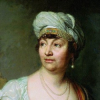Madame de Stael

Madame de Stael
Anne Louise Germaine de Staël-Holstein, commonly known as Madame de Staël, was a French woman of letters of Swiss origin whose lifetime overlapped with the events of the French Revolution and the Napoleonic era. She was one of Napoleon's principal opponents. Celebrated for her conversational eloquence, she participated actively in the political and intellectual life of her times. Her works, both critical and fictional, made their mark on the history of European Romanticism...
NationalityFrench
ProfessionWriter
Date of Birth22 April 1766
CountryFrance
Madame de Stael quotes about
Exile: A tomb in which you can get mail.
[Moralistic] novels are at the same disadvantage as teachers: children never believe them, because they make everything that happens relate to the lesson at hand.
Who understands much forgives much. To understand everything makes us very forgiving ...
The universe is in France; outside it, there is nothing.
[The Germans] so easily confuse obstinacy with energy, and rudeness with firmness.
Life, for me, is living among my friends.
Life teaches much, but to all thinking persons it brings ever closer the will of God - not because their faculties decline, but on the contrary, because they increase.
Of all human sentiments, enthusiasm creates the most happiness; it is the only sentiment in fact which gives real happiness, the only sentiment which can help us to bear our human destiny in any situation in which we may find ourselves.
The mind's pleasures are made to calm the tempests of the heart.
Unhappy love freezes all our affections: our own souls grow inexplicable to us. More than we gained while we were happy we lose by the reverse.
The study of history, it seems to me, leads to the conviction that all important events tend toward the same end - the civilization of mankind.
There are only two distinct classes of people on this earth, those who espouse enthusiasm and those who despise it.
intellect is a sin that must be atoned for by leading exactly the life of those who have none.
The most beautiful landscapes in the world, if they evoke no memory, if they bear no trace of a remarkable event, are uninteresting compared to historic landscapes.